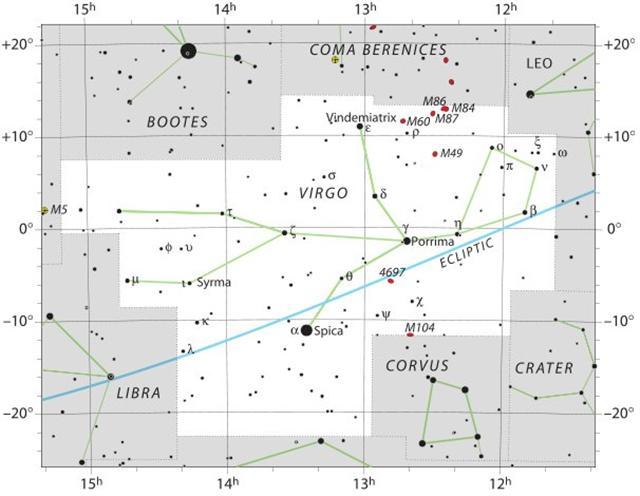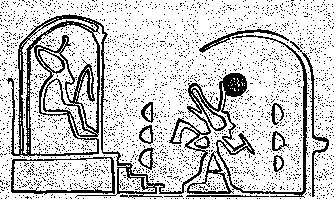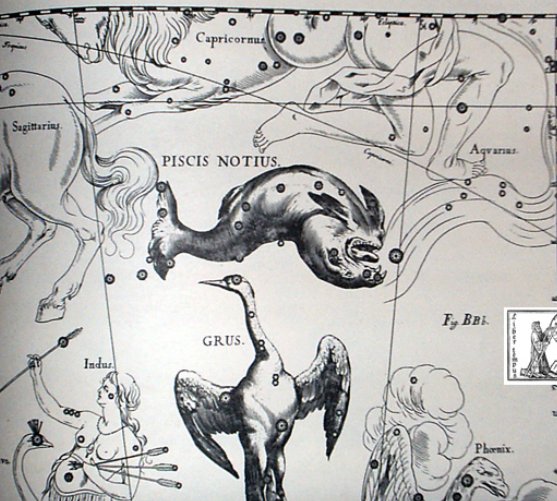TAHUA
22. Beyond heliacal
κ Virginis (→ the
grasping hand which at the proper time would 'eat the Sun' at the horizon in the
west - Chikin)

would evidently come the beginning of side b of the A tablet, and
also the vertical (→
male) pair Syrma
(ι) with Khambalia
(λ) together with the horizontal (→ female) pair υ and φ Virginis:
 |
 |
 |
|
 |
 |
 |
|
Aa8-80 (1329) |
Aa8-81 (666) |
Aa8-82 |
Aa8-83 |
Aa8-84 |
Aa8-85 (1334) |
| ki to hatu huri |
ma to ua mata |
mae tae e ui hia
mai |
kua oho te tagata |
ki te henua |
- |
|
Oct 16 (260 + 29) |
17 (290) |
18 (472 - 181) |
19 |
20 |
21 (294) |
|
*209 |
*210 |
Τ
VIRGINIS |
THUBAN |
*213 |
Κ
VIRGINIS |
|
April 16 (314 *
1½) |
17 (16 * 29½) |
(365 + 108 = 473) |
19 |
ALKES |
21 (111) |
|
To.
1.
Particle
sometimes
used
with the
article
in
ancient
legends;
i uto
to te
hau,
the
ribbon
was in
the
float.
2. To
rise (of
the sun)
during
the
morning
hours up
to the
zenith:
he-to
te raá.
Vanaga.
1. Of. T
Pau.,
Ta.:
to,
of.
Mgv.:
to,
genitive
sign.
Mq.:
to,
of, for.
2. This,
which.
Churchill.
Mgv.:
To,
to make
a canoe
of
planks.
Mq.:
to,
to build
a canoe.
Sa.:
to,
to
build.
Churchill.
Huri. 1. To turn
(vt.), to overthrow, to knock down:
huri moai, the overthrowing of the statues from
their ahus during the period of decadence on
the island. 2. To pour a liquid from a
container: ka huri mai te vai, pour me some
water. 3. To end a lament, a mourning: he
huri i te tagi, ina ekó tagi hakaou, with this
the mourning (for the deceased) is over, there shall
be no more crying. 4. New shoot of banana:
huri maîka. Vanaga. 1. Stem. P Mgv.: huri,
a banana shoot. Mq.: hui, shoot, scion. 2. To
turn over, to be turned over onto another side, to
bend, to lean, to warp; huri ke, to change,
to decant; tae huri ke, invariable; huri
ke tahaga no mai, to change as the wind; tae
huri, immovable; e ko huri ke,
infallible; huhuri, rolling; hakahuri,
to turn over; hakahuri ke, to divine. P Pau.:
huri, to turn. Mgv.: huri, uri,
to turn on one side, to roll, to turn upside down,
to reverse. Mq.: hui, to turn, to reverse. 3.
To throw, to shoot. 4. To water, to wet. 5. To
hollow out. Hurihuri: 1. Wrath, anger;
kokoma hurihuri, animosity, spite, wrath, fury,
hate, enmity, irritable, quick tempered, to feel
offended, to resent, to pester; kokoma hurihuri
ke, to be in a rage. 2. (huri 4)
hurihuri titi, to fill up. 3. To polish. 4. (uriuri).
Hurikea, to transfigure, to transform.
Churchill. Mq. huri, resemblance. Sa.:
foliga, to resemble. Churchill. |

 |
 |
 |
 |
|
Ab1-1 (671
→ 461 + 210) |
Ab1-2 (2 * 336) |
Ab1-3 |
Ab1-4 |
| Te
hoea |
rutua
te pahu - rutua te maeva - atua rerorero - atua ata
tuu |
|
Oct 22 (295, *215)
ARCTURUS
(*215.4)
SYRMA
(*215.6) |
KHAMBALIA (Λ VIRGINIS, *216.4), Υ VIRGINIS (*216.5)
*216.4 - *41.4 = *175.0
KHAMBALIA
(*216.4)
Oct 23 AD 2023 (296)
MARS (*216) |
Oct 24 |
Oct 25 (*218, *584)
Φ
VIRGINIS (*218.7)
FOMALHAUT
|
|
13 Aug (225
→
408
- 183) |
14 Aug (*146,
*512) |
(*513
→
19 * 27
= 9 * 57) |
16 Aug (*514) |
|
CLOSE TO
THE FULL
MOON: |
|
April 22 (112,
*32) |
23 |
24 |
25 (115, *35) |
|
12 Febr (408 - 365 =
43) |
13 Febr (*329) |
All
the 'hearts' |
(*514 - *183
= *331) |
|
Egyptian bread, (-t,
female determinant) |
 |
Phoenician qoph |
 |
Greek phi |
Φ(φ) |
|
... is the 21st letter of the
Greek alphabet ... Its origin is uncertain but it may be that
phi originated as the letter qoppa ... In traditional Greek
numerals, phi has a value of 500 or 500000 ...
Isaac Taylor, History of the Alphabet: Semitic Alphabets,
Part 1, 2003: 'The old explanation, which has again been
revived by Halévy, is that it denotes an 'ape,' the character
Q being taken to represent an ape with its tail hanging
down. It may also be referred to a Talmudic root which would
signify an 'aperture' of some kind, as the 'eye of a needle,'
... Lenormant adopts the more usual explanation that the word
means a 'knot' ...

... The king, wearing now a short, stiff archaic mantle, walks
in a grave and stately manner to the sanctuary of the wolf-god
Upwaut, the 'Opener of the Way', where he anoints the
sacred standard and, preceded by this, marches to the palace
chapel, into which he disappears. A period of time elapses
during which the pharaoh is no longer manifest.

When he reappears he is clothed as in the Narmer palette,
wearing the kilt with Hathor belt and bull's tail
attatched. In his right hand he holds the flail scepter and in
his left, instead of the usual crook of the Good Shepherd, an
object resembling a small scroll, called the Will, the House
Document, or Secret of the Two Partners, which he exhibits in
triumph, proclaiming to all in attendance that it was given him
by his dead father Osiris, in the presence of the
earth-god Geb. 'I have run', he cries, 'holding the
Secret of the Two Partners, the Will that my father has given me
before Geb. I have passed through the land and touched
the four sides of it. I traverse it as I desire.' ...
.jpg) |
Possibly
the culmination (at 21h) of Fom-al-Haut (the Mouth of the thirsty
southern Fish) in October 25 - corresponding to the place for heliacal
φ Virginis - should be counted as the place
from where 'water' (Mem, μ)
would return.

And counted from the Julian
equinox (*84) instead of from the Gregorian in March 21 the
place for October 25 (298) would be 214 days after 0h:
 |
*16 |
 |
*7 |
 |
*13 |
 |
|
Aa8-53 (638) |
Aa8-69 (664 + 654) |
Aa8-76
(664 + 661) |
Ab1-4 (638 + 36 = 674) |
|
Sept 19
(262) |
Oct 5 (278) |
Oct 12
(285) |
Oct 25 (*218, *584) |
|
*182 |
APAMI-ATSA (θ) |
HEZE (ζ,
*205.0) |
Φ
VIRGINIS |
.jpg)
|






.jpg)

.jpg)